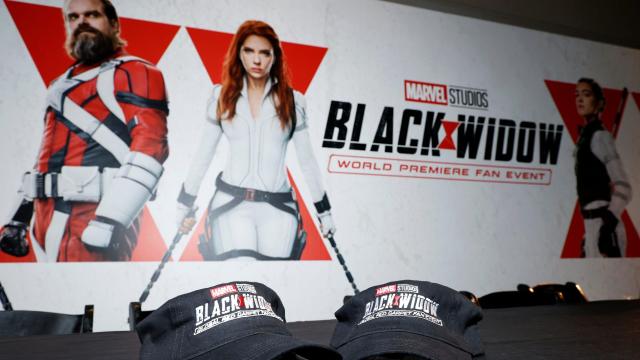After the Walt Disney Company slipped on a banana peel and released Black Widow on streaming on the same day of its theatrical release, severely cutting into the film’s box office earnings and prompting a lawsuit from its star, Scarlett Johansson, the company’s CEO doubled down on its ability to “fairly compensate” talent regardless of film release method.
During the company’s third-quarter earnings call on Thursday, Disney boss Bob Chapek said said that the company has “entered hundreds of talent arrangements with our talent” since the start of the covid-19 pandemic, and said that, by and large, “they’ve gone very very smoothly, so we expect that that would be the case going forward.”
Although Johansson isn’t explicitly mentioned, that response certainly sounds like a refutation of the lawsuit she brought against Disney in July, which alleges that the company’s decision to debut Black Widow on Disney+ “Premiere Access” on the same day of its theatrical release had resulted in a breach of her contract, which had unambiguously tied her salary to the film’s box office performance, as well as substantial financial losses.
For the stars of major blockbusters, it’s common practice to have a stipulation in your contract that says that your earnings from the film will be contingent upon its box office success, but the advent and ubiquity of streaming has muddied those waters. As Gizmodo previously reported, a source familiar with Johansson’s contract told the Wall Street Journal that the actress stood to lose as much as $US50 ($68) million from the movie, the direct result of its streaming release cutting into box office returns.
During Thursday’s call, Chapek defended the way Disney has opted to release its films throughout the pandemic, which has included traditional theatrical releases, straight-to-streaming Disney+ exclusives, and a hybrid model that combines the two. The company, he said, is “reacting to a very fluid situation in terms of the marketplace,” but he added that the current slate of films was “conceived under a time when we did not know what was going to be happening with consumer behaviour three, four years later and certainly didn’t know about covid at the time.”
In 2021 alone, several other key Disney titles have joined Black Widow in the hybrid model release pool, including Jungle Cruise, Mulan, and Cruella. Of those, however, Black Widow has been by far the biggest same-day release success, with Disney+ subscribers shelling out more than $US60 ($81) million to stream it digitally.
“Bob Iger and I, along with the leaders of our creative and distribution teams, determined this was the right strategy because it would enable us to reach the broadest possible audience,” Chapek said during the call. “And just to reiterate, distribution decisions are made on a film-by-film basis based on global marketplace conditions and consumer behaviour.”
“We will continue to utilise all available options going forward, learn from insights gained with each release, and innovate accordingly while always doing what we believe is in the best interest of the film and the best interest of our constituents,” he added.
The comments come alongside the news that Disney+ blew analyst expectations out of the water in Q3 by netting 116 million paid subscribers — over a 100% year-over-year increase.
